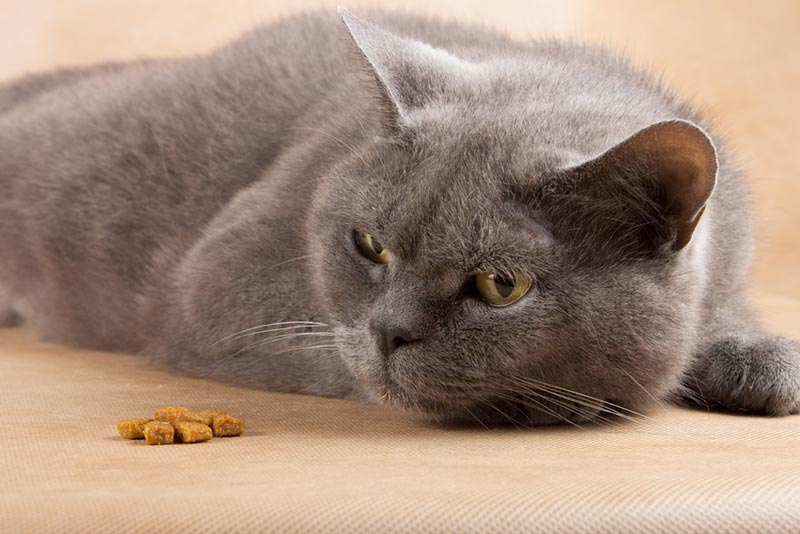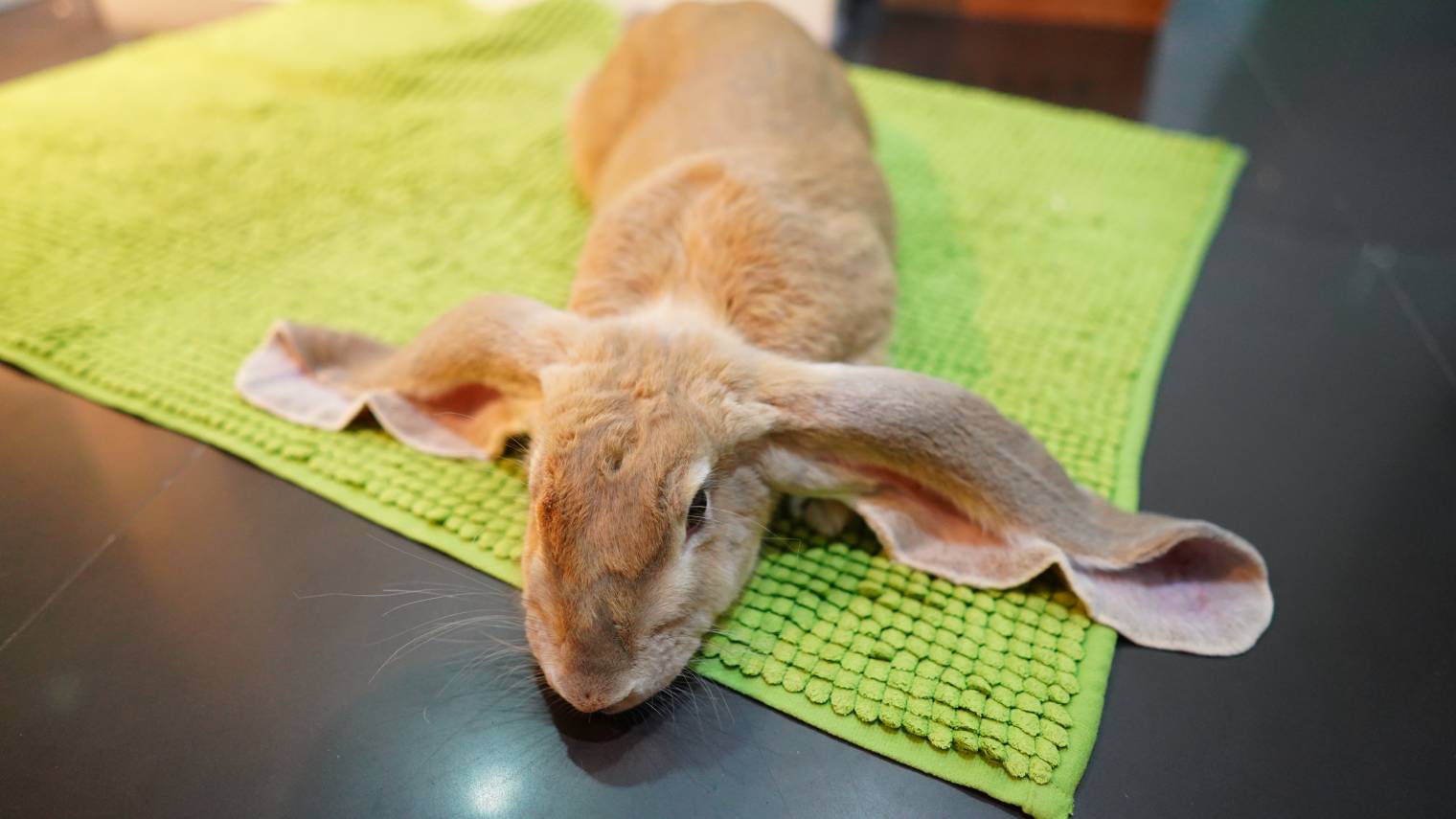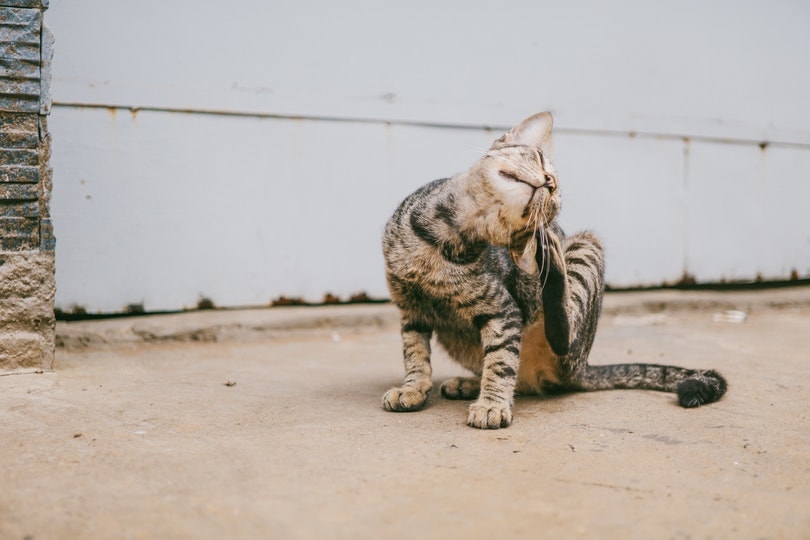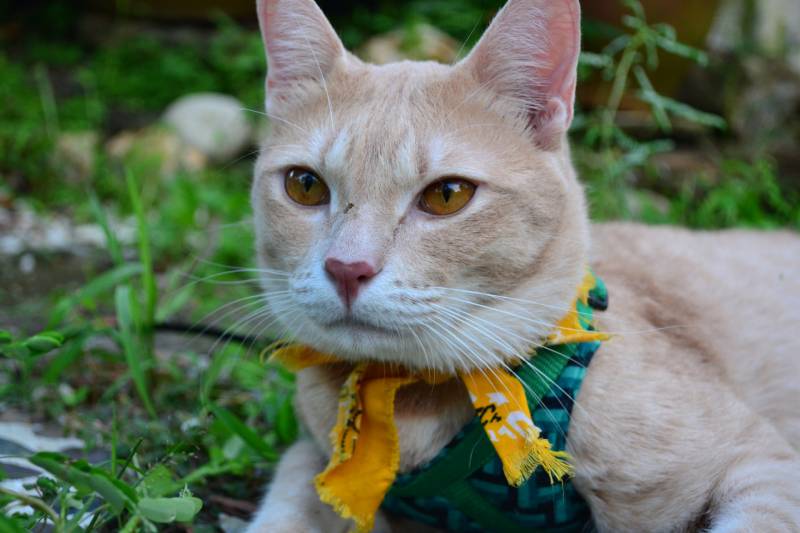VET APPROVED

The information is current and up-to-date in accordance with the latest veterinarian research.
Learn more »Click to Skip Ahead
When your cat suddenly stops eating, it can be a worrying time, and it’s clear you need to take action. Figuring out which steps to take very much depends on why your cat has stopped eating.
Reasons can vary from the simple, where you can do something by yourself to help your cat regain its appetite, to the very serious, where veterinary intervention is necessary. Read on to discover the possible reasons behind your cat’s sudden inappetence.

The 10 Reasons Why Your Cat Suddenly Stopped Eating
1. A Change to Your Cat’s Food
Cats aren’t big on change, so you might find that if you’ve made an unexpected change, your cat will go on a hunger strike as a form of protest. To determine if this is bothering your cat, offer them a bit of their old food.
If they start eating again, you’ll know what the problem is. It could be that they dislike the new food, or it was changed, in which case you’ll need to take a more staggered approach by mixing the old food in with the new over a couple of weeks to get them used to the change. You might also find your cat rejects their current food if a manufacturer changes ingredients without any warning.
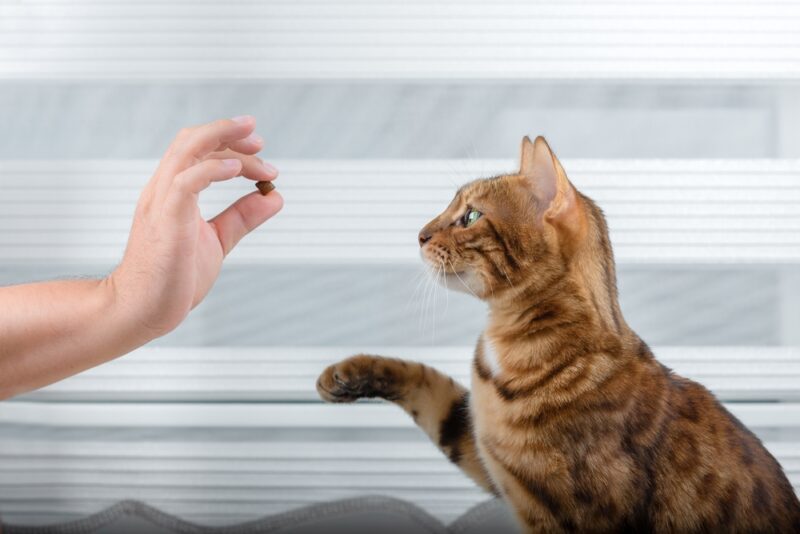
2. A Bad Experience
A cat may develop a food aversion if they associate the food with a time they had an upsetting experience or felt unwell. If your cat has been sick or recently came from the hospital or cattery, this may be what’s bothering them.
Encourage them by adding something particularly tasty or strong smelling to their food. You might have to try a different food if this is unsuccessful.
3. Household Changes
Changing a cat’s routine or environment can cause them to become stressed. Changes can range from having builders remodel, having a new baby, or welcoming in a new pet. Of course, changing your routine (and, in turn, their routine) isn’t always avoidable.
You can counteract this disruption by making your cat a safe space. Set up an area with everything they need as far away from what’s stressing them out as possible. You could also invest in a pheromone diffuser, which can help your cat relax in stressful situations.
4. Dining Out
If your cat is not eating but not losing weight (or even gaining weight), then it could be possible that they’re eating elsewhere. Some cats are good at self-regulation, while others will eat if offered food. Some even go so far as to keep eating even when they’re full.
If this sounds like your outdoor kitty, you could attach a note to their collar to ask people not to feed them or keep them indoors for a few days to see if they regain their appetite.
5. Vomiting or Diarrhea
An upset stomach is a common cause of inappetence in most animals, including cats. If there haven’t been any obvious signs, check your cat’s litter box for evidence of diarrhea, or be sneaky and watch them when they go outside.
There are also a range of digestive problems that could be the cause, like acid reflux, parasites, tumors, irritable bowel disease, and an imbalance of intestinal bacteria. It’s a good idea to contact your vet if your cat has an upset stomach. They might ask you to monitor your cat at home, start a probiotic, or bring them in for a check-up.
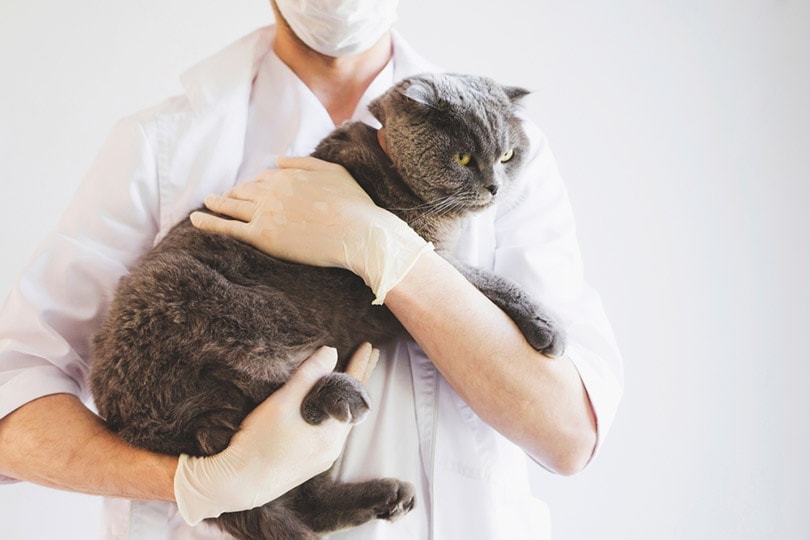
6. Foreign Bodies
Cats are more cautious when eating things they shouldn’t in comparison to dogs, but curiosity can still get the better of them. If they eat something that then becomes stuck in the stomach or intestines, it is referred to as a gastrointestinal obstruction or GI obstruction.
This GI obstruction stops food from passing through the digestive tract and could cause vomiting or inappetence. Some foreign bodies will pass on their own, while others will require surgery.
7. Dental Disease
Cats can suffer from inflammation of their gums, fractured teeth, resorptive lesions on their teeth, and dental abscesses. Painful or diseased teeth will stop your cat from eating.
As a pet owner, dental issues are difficult to diagnose in a cat, and it isn’t always safe to check your cat’s mouth and come away without any injury. However, your vet can sedate your cat to check, if necessary.
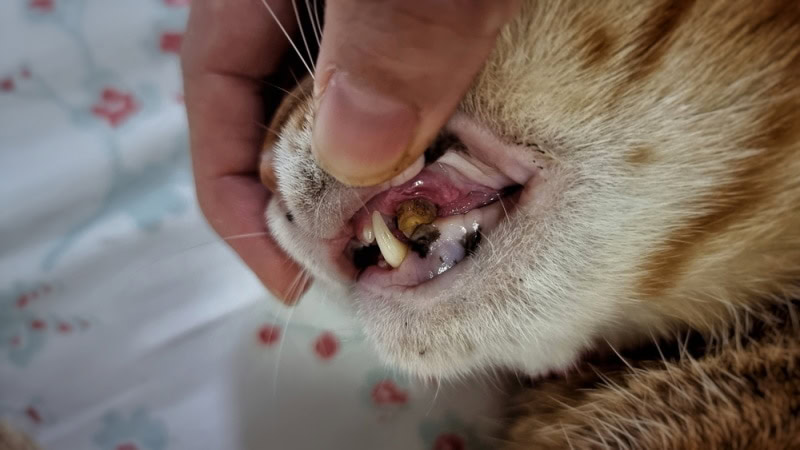
8. Respiratory Diseases
Respiratory diseases can affect your cat’s ability to breathe or smell, which leads to a loss of appetite. An upper respiratory disease might clog your cat’s nose and eyes with discharge, resulting in a restriction or complete loss of smell and sight.
Lower respiratory tract diseases affect their lungs, which results in difficulty breathing. These issues might be caused by viral or bacterial infections that require basic care but could also be much more serious, like cancer. Contact your vet if you are concerned about a respiratory issue affecting your cat.
9. Lethargic or Grumpy Cat
If you’ve noticed a change in your cat’s behavior, it could signify that something more serious is going on. Cats that are ill will generally hide and become aggressive if you attempt to move or disturb them.
This could be a sign of infection, pain, or fever. Combined with a lack of appetite or sleeping more, they are worrying signs. So, if this sounds like your cat, take them to the vet.
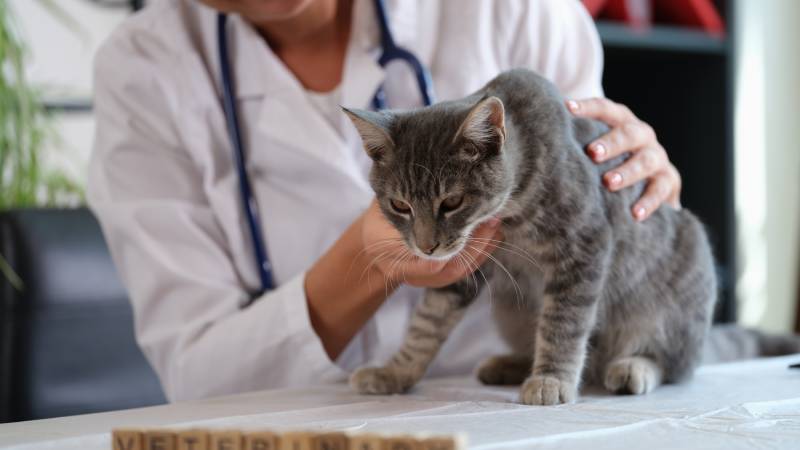
10. Diabetes and Hyperthyroidism
These endocrine diseases can both cause extreme hunger at first in cats. You’ll find your cat doesn’t put on any weight and will tend to lose its appetite as the disease progresses.
If your cat has previously always had a good relationship with food and is middle-aged or older, it’s worth considering that diabetes or hyperthyroidism is to blame for their lack of appetite. If this sounds like your cat, contact your vet, and they can suggest the best diagnostic and treatment plan.

Frequently Asked Questions
What Do You Do If Your Cat’s Not Eating?
Cats are particularly good at hiding when they’re not feeling well or in pain, and as a pet parent, you must pay attention and react to any changes in your cat’s behavior. Contact your vet if your kitten has not eaten for 1–2 days or your adult cat hasn’t eaten in 2 days. Quick action is vital as adult cats, especially overweight ones, can develop a severe disease called hepatic lipidosis if they stop eating.
- Anorexia
- Behavior changes
- Diarrhea
- Digestive upset
- Drooling
- Jaundice
- Lethargy
- Vomiting
- Weight loss
What Is Hepatic Lipidosis?
Hepatic lipidosis is also known as fatty liver syndrome and is unique to cats and one of the most common liver diseases in felines. It generally affects cats that have recently gone through a period of anorexia for 3–4 consecutive days.
When a cat’s body breaks down fat rapidly to supply nutrients and energy, it can be overwhelming for the liver to process. This fat is then stored in and around the liver cells, which further compromises liver function. If the cat develops jaundice, which will be evident from a yellow color to the whites of the eyes or skin, the disease can be fatal if not treated quickly and aggressively.
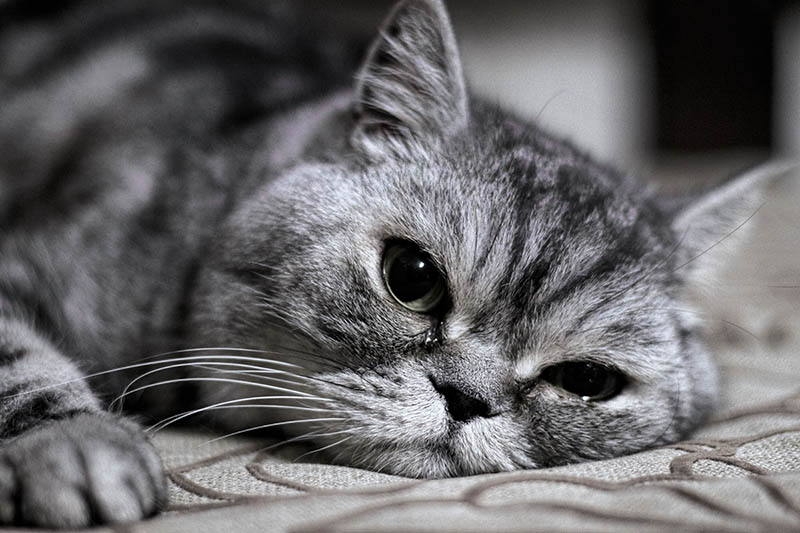
Treatment Options for Loss of Appetite
The treatment options available depend very much on the cause of your cat’s loss of appetite.
- Antibiotics
- Diet change
- Hospitalization and fluid therapy
- Medication
- Surgery
- Feeding your cat foods with different shapes, flavors, and textures.
- Warming up food if it’s been stored in the refrigerator.
- Avoiding large purchases of food. Packaging that’s been open for over a month can go stale and rancid.
It’s important for you to watch out for unusual signs, react quickly, and know when to seek help.

Conclusion
Whatever the cause of your cat’s inappetence, it can be a worrying time. Our aim as pet parents is to make sure our pets are happy and healthy. Thankfully, there are solutions to this problem, whether it’s trying to stimulate their appetite at home, changing their diet, or taking them to see the vet. We hope this list has helped you narrow down what is ailing your feline friend, and you’re one step closer to getting them back to their normal self.
Featured Image Credit: Elena Kutepova, Shutterstock
